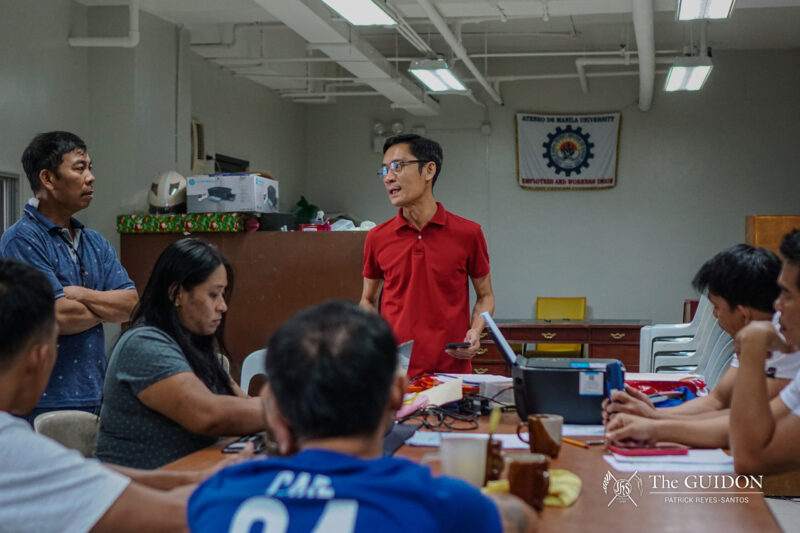THE ATENEO Economics Association (AEA) hosted its first set of socio-economic forums of its series, KamalAEAn, which was held on March 8 at the Leong Hall Auditorium.
Senator Antonio Trillanes IV and Atty. Benedicto Gonzales, who filled in for presidential candidate Mar Roxas, were invited by AEA to share their personal opinions regarding political dynasties in the country and how Filipinos can help in improving the state of their government.
The forum began with opening remarks from AEA President Francis Manuel, who shared that AEA plans to continue engaging the Ateneo community in relevant discourse, and to continue promoting awareness on the different issues in the country through KamalAEAn.
“As we approach the 2016 national elections, we once again confront the perennial issue of political dynasties and its effect, not only [its] political [effect], but also [its effect on] the economic landscape of the country,” Manuel stated.
Dynasties versus corruption
During his talk, Trillanes tackled his personal beliefs towards the political dynasties in the country.
He mentioned that although the 1987 Constitution prohibited political dynasties, there are around 250 dominant political dynasties all over the country, and that 70 percent of lawmakers come from these dynasties.
While Trillanes acknowledged the problems that surround the different dynasties in Philippine politics, he personally believed that the political dynasties themselves are not the problem, and that corruption is the real root of the issue.
“Is being part of a political bloodline truly a problem, or do we draw the line between good or bad ones?” he asked.
Trillanes relayed how Vice President Jejomar Binay was appointed as the officer-in-charge of Makati in 1986 by then President Corazon “Cory” Aquino to replace the previous dynasty, and how people saw this replacement as “the perfect appointment.”
He also added that Binay became the patriarch of a 30-year political dynasty, and that the Binay family has illegally amassed Php 11 billion in cash, and many more pesos in properties and corporations, among other things.
He also mentioned that while political dynasties are also present in the United States of America (USA), it still manages to conduct clean elections as voters are well-informed and candidates are scrutinized by the voters on “just about anything.”
Trillanes related this to how the masses are not properly educated on the different candidates, and resort to “going with the flow” during election season without properly scrutinizing the candidates’ records and character.
“There are no good or bad dynasties, simply corrupt and non-corrupt officials,” he said.
Families in politics
Atty. Gonzales, lawyer to presidential candidate Mar Roxas, delivered a message from Roxas himself regarding his personal opinions on the prevalence of political dynasties in the Philippines.
Gonzales stated that Roxas wished to be present at the event, however he could not make it due to his busy schedule.
Roxas’ message read he was in favor of the anti-dynasty bill, and he believed that no family should have monopoly over any service.
He also believed that candidates of the same family have easier access to machinery, and have an advantage as their name will be retained in office longer, which will make it easier for voters to remember their family name and legacy.
“It’s natural for members of Filipino families to help each other out, and while it’s admirable, it’s different once politics are involved,” Roxas’ message read.
He also stated that public service is a calling and not a birthright, as people who feel the need to serve their country should be equally likely to earn a position in government.
Agreements and disagreements
Questions submitted through an online form prior to the forum were raised during the open forum.
The speakers tackled the circumstances that cause political dynasties to thrive in the Philippines.
Trillanes and Gonzales both agreed that the marginalized sectors in the Philippines lack access to information about the candidates, and resort to name recall when voting.
Another issue was raised on whether democracy was still the best form of government for the country, and both Trillanes and Gonzales felt that democracy was still appropriate for the country, despite the fact the Philippine government is “not yet fully evolved.”
“The country is a developing country, there are growing pains, but we will get there, surely and slowly, if, and only if, we get to pick the right leaders,” Trillanes said.
A question directed at Trillanes was raised on how political dynasties affected his pursuit as a politician.
Trillanes then recalled how he was detained in prison from 2007 to 2010, had no access to money or any other resource, and was against powerful political figures, yet won the 2007 Senate elections.
He mentioned he did not want to deprive anyone of the opportunity to serve for any reason, and restated that the problem did not lie in the dynasties themselves, but in corruption.
Trillanes added that the USA had no problems with political dynasties as their dynasties have no trace of corruption, and that dynasties in the Philippines would not be an issue if it were not for the perennial problem of corruption.
“No corruption—anybody in the family, as long as you are serving your country well, by all means, serve,” Trillanes said.
A concern was raised regarding the accessibility of politicians to the people, especially on the level of local government units, with Trillanes explaining “that the best way to improve the quality of the government would be to participate.”
He then invited the youth to take part in the voting process in order to reform government, and reiterated that the youth does not scrutinize candidates as much as they should, as seen during the 2010 presidential elections.
“When Cory died, they thought Noynoy would be the savior, but was he? He wasn’t, but everybody went with the flow,” Trillanes said.
Trillanes said he plans to vote for presidential candidate Grace Poe in the upcoming elections, stating that he hopes for more transparency and good governance, as Poe has had no blemish of corruption on her track record.
Meanwhile Gonzales compared Poe’s clean five-year record to Roxas’ 23 untainted years of public service, and believed that a sincere and honest government will restore the trust of the people.
He then elaborated on how the “next level” for Philippine politics meant more investment, more money circulating in the economy, and more economic growth.
“The economic growth [during Aquino’s presidency] did not translate to inclusive economic transparency, but that’s why we need the second level, because we need to be more inclusive,” Gonzales added.








Tiwala ako kay Trillanes! Kelangan linisin ang gobyerno at alisin ang korapsyon! Hindi sapat ang kandidato na hindi magnanakaw. Ang kelangan natin ay yung LUMALABAN SA KORAPSYON! Sa lahat ng kandidato, si TRILLANES lang ang Matapang, May Paninindigan at Malasakit sa taumbayan! TRILLANES para BISE PRESIDENTE!